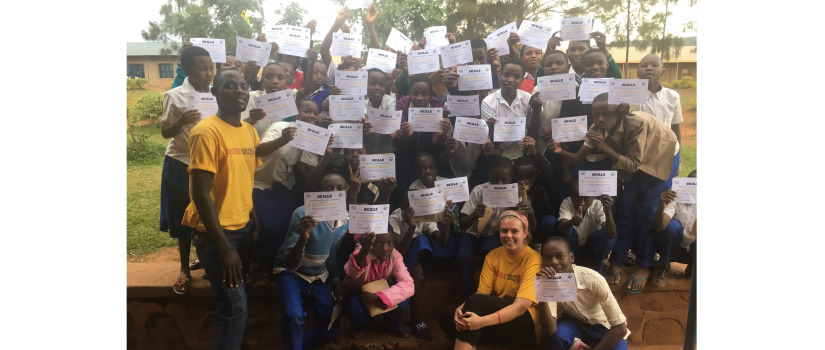July 27, 2020 | Erin Bluvas, bluvase@sc.edu
Emily Loud began a two-year term in the Peace Corps shortly after she graduated with a bachelor’s degree in linguistics and international affairs at the University of New Hampshire in her home state. Based in Rwanda, Loud was working at an English teacher at a rural school, but it quickly became apparent that public health was her true passion.
“I spent the majority of my service working with my Rwandan co-teachers to integrate malaria and HIV prevention into our English teaching and developed a malaria prevention curriculum that teachers at my school are using still to this day,” Loud says. “I also co-facilitated trainings on sexual and reproductive health, including a school-wide training on making reusable menstrual pads with both my female students and co-teachers.”
During her time in Rwanda, she began looking into programs that might align with her own growing interests in the public health field and discovered the Arnold School’s Department of Health Promotion, Education, and Behavior (HPEB).
“Being a health educator in Rwanda was extremely rewarding, so when I read about the HPEB department, I was immediately interested in expanding my knowledge on how to promote sustainable behavioral changes in order to improve the health of individuals and communities,” she says. “I was so interested in the Master of Public Health in HPEB program that I applied while still in Rwanda and moved here immediately after finishing my Peace Corps service.”
Although she has interests in other topics (e.g., infectious diseases, sexual and reproductive health), Loud has refined her focus to tobacco control and smoking cessation. As a graduate research assistant for HPEB professor Jim Thrasher, she assists with collecting, analyzing, and interpreting data for several of the internationally recognized expert’s federally funded projects related to health warning labels on cigarette packs and reduced nicotine cigarette messaging. This area of public health has a personal significance for Loud as well.
“My grandfather died of lung cancer when I was 10 years old and in one of our last conversations, he made me promise him that I would never smoke,” she says. “It’s important to me that I not only fulfill that promise but do what I can to help other people avoid smoking as well.”
An August graduate, Loud is the recipient of the Ann Cassady Endowed Fellowship and the HPEB Outstanding Master’s Student Award and will continue her studies with a Ph.D. from her department. She plans to continue exploring health communication and health policy related to tobacco and would like to work in a global health setting at some point.
As a doctoral student, Loud is also looking forward to continuing to work with her mentors, which include Thrasher and HPEB faculty Donaldson Conserve and Deborah Billings. “Dr. Thrasher has been instrumental in my growth as a public health student and researcher and is always providing me with new ideas and opportunities to expand my skills and explore new topics,” Louds says. “I’ve also worked closely with both Dr. Conserve and Dr. Billings on two separate projects related to sexual and reproductive health and justice, and their guidance has been extremely influential in my development of qualitative research skills and data analysis.”
Now firmly in route to becoming a public health professional/researcher, Loud highly recommends the field to others – particularly in the present climate. “I’m sure the current COVID-19 pandemic will inspire a large wave of interest in this field – it’s an exciting time to be a public health student, and I would encourage anyone with an interest in public health to apply,” she says. “And once you begin studying public health, I would encourage you to explore everything that interests you. The wider your scope of knowledge and experience, the more effective of a public health professional you will become.”
